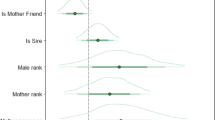Summary
Playback experiments were conducted of five groups of free-ranging vervet monkeys (Cercopithecus aethiops) to determine whether an adult male's responsiveness to infant distress calls was a function of (1) paternal certainty, (2) dominance rank, (3) predator presence, (4) number of males, (5) number of infants, (6) infant's mother's rank and/or (7) infant's age. Results from these experiments reveal that paternal certainty was the only factor that could directly explain the differences between males in the duration of response to distress calls.
Similar content being viewed by others
References
Andelman SJ (1985) Ecology and reproductive strategies of vervet monkeys (Cercopithecus aethiops) in Amboseli National Park, Kenya. Ph.D. diss., University of Washington
Bateson PPG (1983) Mate choice. Cambridge University Press, Cambridge
Busse CD, Hamilton WJ III (1981) Infant carrying by male chaema baboons. Science 212:1282–1283
Cheney DL, Seyfarth RM (1981) Selective forces affecting the predator alarm calls of vervet monkeys. Behaviour 76:25–61
Cheney DL, Seyfarth RM (1982) How vervet monkeys perceive their own grunts: field playback experiments. Anim Behav 30:519–529
Cheney DL, Seyfarth RM, Andelman SJ, Lee PC (1986) Reproductive success in vervet monkeys. In: Clutton-Brock TH (ed) Reproductive success. Chicago University Press, Chicago (in press)
Emlen ST (1984) Cooperative breeding in birds and mammals. In: Krebs JR, Davies NB (eds) Behavioural ecology. Sinauer, Sunderland, Massachusetts
Holmes WG, Sherman PW (1983) Kin recognition in animals. Scient Am 71:46–55
Kleinman DG, Malcolm JR (1981) The evolution of male parental investment in mammals. In: Gubernick DJ, Klopfer PH (eds) Parental care in mammals. Plenum, New York (pp 347–387)
Maynard Smith J (1977) Parental investment — a prospective analysis. Anim Behav 25:1–9
Shaikh AA, Celeya CL, Gomez I, Shaikh SA (1982) Temporal relationship of hormonal peaks to ovulation and sex skin deturgescence in the baboon. Primates 23:444–452
Smuts BB (1986) Sexual competition and mate choice. In: Smuts BB, Cheney DL, Seyfarth RM, Wrangham RW, Struhsaker TT (eds) Primate societies. Chicago University Press, Chicago (in press)
Struhsaker T (1967a) Auditory communication among veryet monkeys (Cercopithecus aethiops). In: Altmann SA (ed) Social communication among primates. Chicago University Press, Chicago
Struhsaker T (1967b) Ecology of vervet monkeys (Cercopithecus aethiops) in the Masai Amboseli game reserve, Kenya. Ecology 48:891–904
Taub DM (1984) Primate paternalism: an evolutionary and comparative view of male investment. Van Nostrand Reinhold, New York
Whitten P (1982) Female reproductive strategies among vervet monkeys. Ph D diss., Harvard University
Whitten P (1986) Infants and adult males. In: Smuts BB, Cheney DL, Seyfarth RM, Wrangham RW, Struhsaker TT (eds) Primate societies. Chicago University Press, Chicago (in press)
Author information
Authors and Affiliations
Rights and permissions
About this article
Cite this article
Hauser, M.D. Male responsiveness to infant distress calls in free-ranging vervet monkeys. Behav Ecol Sociobiol 19, 65–71 (1986). https://doi.org/10.1007/BF00303844
Received:
Accepted:
Issue Date:
DOI: https://doi.org/10.1007/BF00303844




